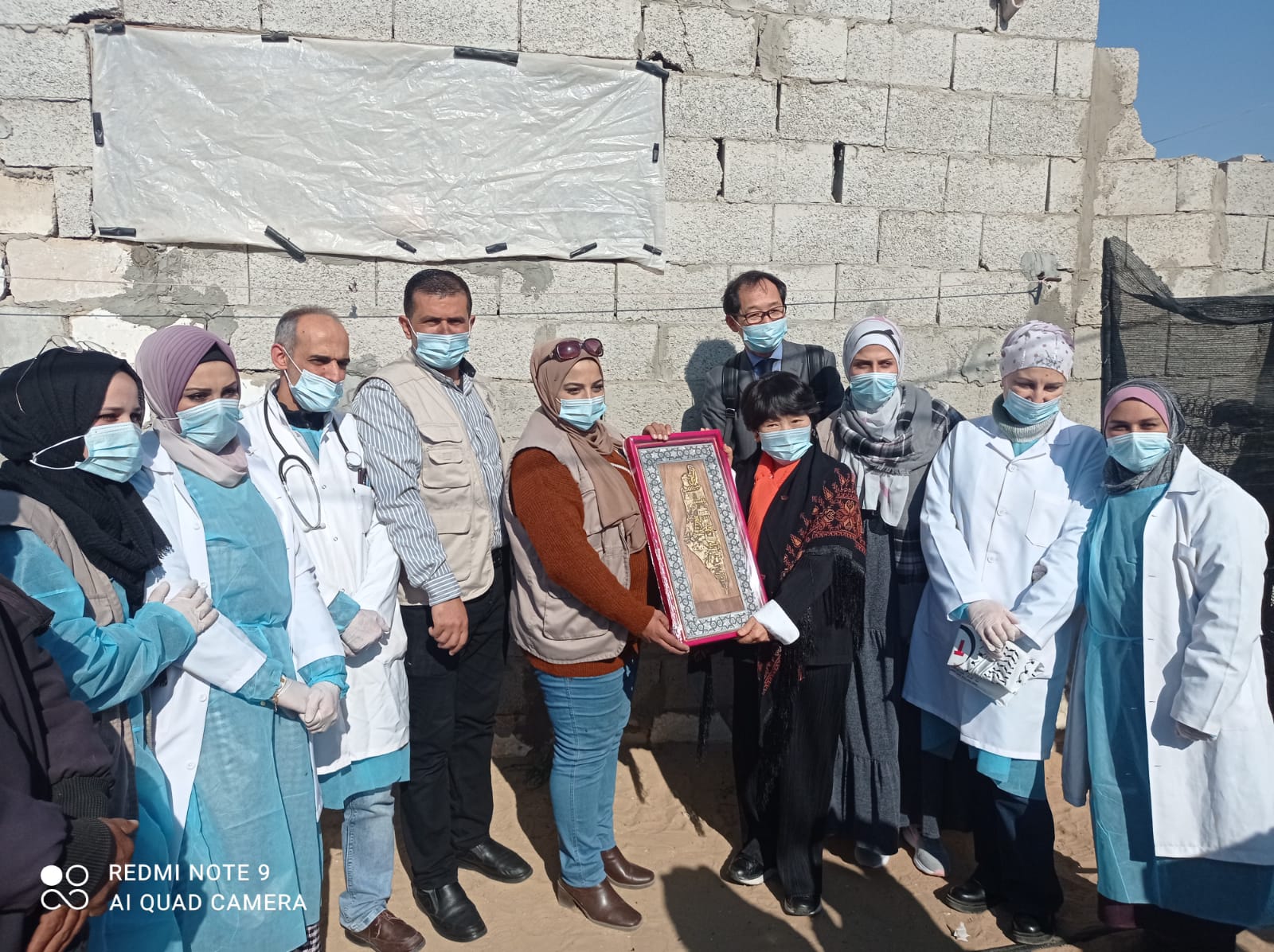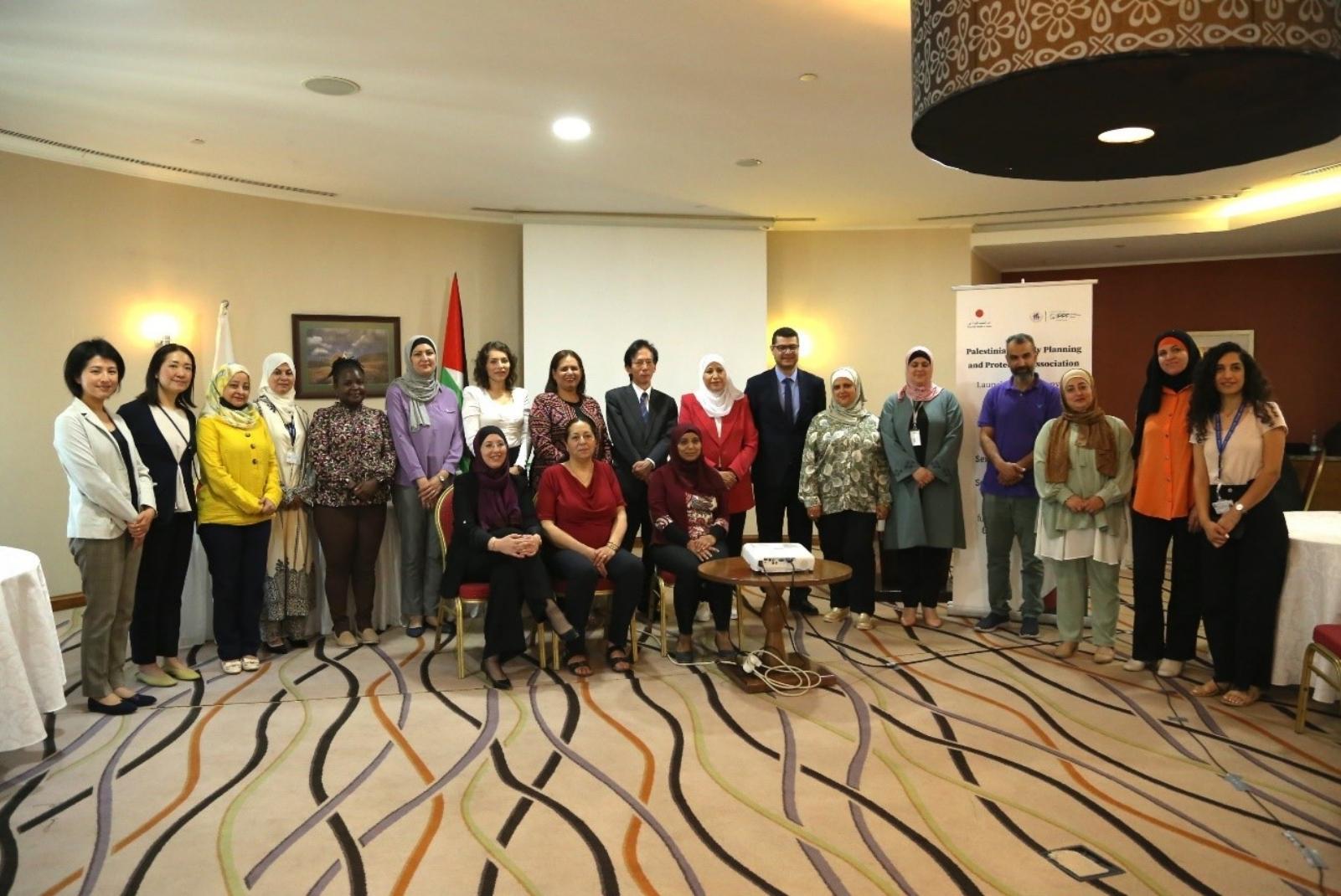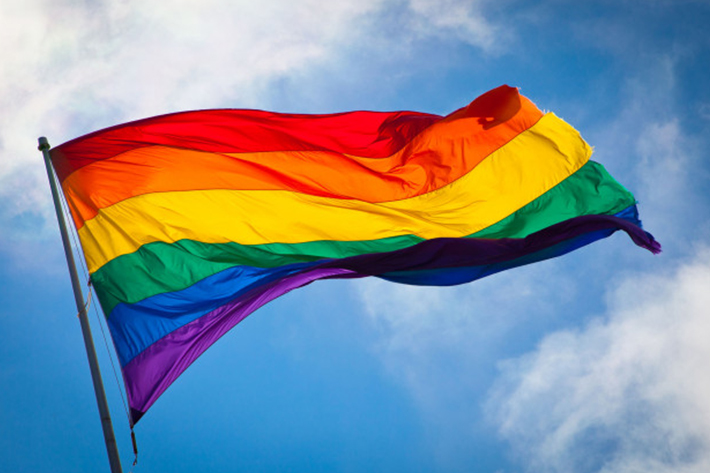
Spotlight
A selection of news from across the Federation

IPPF Statement on the 68th session of the Commission on the Status of Women (CSW)
IPPF welcomes the agreed conclusions of the 68th session of the Commission on the Status of Women (CSW), on the theme of “Accelerating the achievement of gender equality and the empowerment of all women and girls by addressing poverty and strengthening institutions and financing with a gender perspective”. IPPF actively engaged in the process by providing technical inputs to Member States, raising awareness about the interlinkages between SRHR, poverty, gender equality and the empowerment and human rights of all women and girls.
Filter our news by:


| 27 February 2024
Government of Japan awards IPPF $1.9 million to support women and girls affected by natural disasters and conflicts around the world
With support from the Government of Japan, International Planned Parenthood Federation’s (IPPF) Member Associations in five countries, namely Afghanistan, Palestine, Sudan, Ukraine and Yemen, will provide urgent sexual and reproductive health (SRH) services to communities affected by natural disasters and conflict situations. These IPPF Member Associations will: Provide sexual and reproductive health (SRH) and maternal and child health services for women and girls and marginalized communities in six remote and flood affected provinces in Afghanistan; Provide urgent sexual and reproductive health services to communities affected by the escalating violence in Palestine; Improve accessibility of services and community sustainability to decrease sexual and reproductive health-related mortality and morbidity of women and girls in three States with high internally-displaced populations in Sudan; Restore health facilities and access to maternal health services in conflict affected areas for populations affected by the destruction of the Kakhovka Dam in Ukraine; Provide critical sexual, reproductive and maternal health care to internally displaced people and local communities in Yemen. This vital funding from Japan will help with provision of badly needed but currently missing health services, especially for women, so that they can live with dignity and free from unwanted pregnancies, death of themselves and their newborns, and reproductive ill-health. It will allow us to provide essential and quality SRH and maternal and child health services in the communities, prevent and manage the consequences of sexual and gender-based violence, including the clinical management of rape, equip community-based midwives with skills to provide high quality obstetric and neonatal services and strengthen health information systems to collect high quality data to respond to the needs and priorities of women and girls’ health. IPPF Director General, Dr Alvaro Bemejo, said, "I offer heartfelt thanks to the Government of Japan for their unparalleled generosity to enable IPPF to respond to the needs of women and girls caught up in crises around the world. This generosity will allow IPPF and our local partners to provide a critical lifeline to the growing number of people in desperate need of humanitarian assistance." By the end of December 2024, IPPF, through our local partners in the five countries, will aim to deliver health services and information to at least 239,000 people in total. For further information, please contact Yuri Taniguchi, IPPF London Office, at [email protected]. Photo Credits: IPPF/Hannah Maule-ffinch/Sudan

| 01 December 2023
IPPF marks World AIDS Day by announcing the launch of a special program to roll out new biomedical HIV prevention methods
IPPF provides comprehensive sexual and reproductive health care to clients around the world. HIV testing, prevention, and treatment services are essential parts of our integrated sexual and reproductive health care package. To expand the choices individuals have to protect themselves from HIV, IPPF is excited to announce a special program to provide the newest methods of HIV prevention - injectable PrEP (a 2-monthly injection of cabotegravir-LA) and the vaginal ring (a monthly vaginal ring of dapivirine), as well as expanding where oral PrEP is offered. This program is being launched through a consortium of IPPF Member Associations called the Consortium to Advance Access to new HIV Prevention Products (CAAPP) - led by Family Planning Association of India, and including the Family Life Association of Eswatini, Lesotho Planned Parenthood Association, Family Planning Association of Malawi, Federation of Reproductive Health Associations, Malaysia, Family Planning Association of Nepal, and Planned Parenthood Association of Thailand. We hope this program will increase access to the number of ways people can protect themselves from HIV, supporting individual's choice to find an HIV prevention method that works for them.

| 07 March 2023
Japanese MP and Ambassador to Palestine visit IPPF Member Association in Gaza
On 17 January 2023, Japanese House of Representatives member Dr Toshiko Abe and Ambassador Yoichi Nakashima, Ambassador of Japan to Palestine and Representative of Japan to Palestine, visited the activity sites of the project "To improve human security in Palestine: bringing life-saving sexual and reproductive health services to those who need them most", which is being implemented by IPPF’s Member Association in Palestine, the Palestinian Family Planning and Protection Association (PFPPA) with support from the Government of Japan. They visited al Namsawi Neighbourhood in Khan Younis, a particularly marginalised area in northern Gaza, where health services are working very hard to reach for the local population. Dr Abe observed a medical campaign run by a PFPPA team together with staff of the UN Relief and Works Agency for Palestinian Refugees (UNRWA). The medical team consisting of a gynecologist, a pediatrician, a nurse, a social worker and volunteers, provides services such as treatment of sexually transmitted infections treatment, anemia, sexual abuse and harmful sexual practices, attempted unsafe abortion, GBV screening and counselling to the target population. PFPPA was established in Jerusalem in 1964, and is an independent, non-profit, and non-governmental association working in both Gaza and West Bank. PFPPA focuses on the provision of comprehensive and diverse sexual and reproductive health, including that related to SGBV. Their focus is on women and girls, the vast majority being served within a humanitarian context. The project will continue its activities in Gaza and the West Bank (Halful, Bethlehem and Ramallah) until the end of August 2023. More information about the project can be found here. More information on PFPPA can be found here.

| 10 June 2022
Palestine set to receive $600,000 from Japan to support human security and sexual and reproductive healthcare
On 8 June 2022 in Ramallah, Palestine, there was the inauguration of the project “Improving Human Security in Palestine Through Life-saving Sexual and Reproductive Health (SRH) Services for People Most in Need," funded by the Government of Japan and implemented by the Palestinian Family Planning and Protection Association, which is IPPF’s Member Association in Palestine. Recent studies indicate an increase in the number of cases of gender-based violence in Palestine, which requires rapid and timely interventions in terms of psychological and social support, medical services, women and child health services, and sexual and reproductive health services for survivors. This project will seek to address these unmet needs, by providing quality clinic-based SRHR services for women, youth and vulnerable communities in Gaza and the West Bank. It will also expand access to high-quality, life-saving sexual and reproductive health services to communities. Mr. Masayuki Magoshi, Ambassador of Japan for Palestinian Affairs, said, “We believe that having to living in fear of violence and sexual abuse are core issues of universal human rights. Peace in the region will never be attainable or sustainable in the long term if we do not apply a gender lens to issues. This project is significant in terms of Japan’s continuous commitment toward Palestinian people, especially women. I would like to reaffirm our commitments in line with international solidarity to Palestine, to ensure the implementation of the targets for the 2030 Agenda on maternal, newborn and maternal health in emergencies and ensuring that women have access to comprehensive health care.” Dr. Amal Hamad, the Palestinian Minister of Women Affairs, said, “the health sector plays a major role in providing comprehensive primary health care to all members of the society, especially services which are directed to women. We are committed to the SDGs especially SDG 3 and SDG 5 in particular and we will keep working to promote for them.” Mr. Sami Natsheh, the Board of Directors President for the Palestinian Family Planning and Protection Association, said, “The project aims at enabling vulnerable and underserved Palestinian women and girls living in difficult humanitarian environments to access and promote sexual and reproductive health services and rights, including services to reduce and combat sexual and gender-based violence by increasing the provision of high quality sexual and reproductive health services.” Dr Fadoua Bakhadda, Regional Director, IPPF Arab World Regional Office, said, ”This project is like a life jacket for women in Palestine, especially those in protracted crisis areas. This funding will ensure the continued provision of essential sexual and reproductive health services, including safe delivery, pregnancy care, family planning, HIV and disease prevention, sexually transmitted infections and their treatment, quality post abortion care, and psychosocial support for survivors of gender-based violence”. Palestinian Family Planning and Protection Association (PFPPA): Established in Jerusalem in 1964, the PFPPA is an independent, non-profit and non-governmental organization registered locally and IPPF’s Member Association in Palestine. PFPPA has service delivery points, located in the West Bank Areas of Ramallah, Bethlehem, Hebron and Halhoul, in addition to one in the Gaza Strip. In cooperation with local partners PFPPA is also responsible for 4 safe spaces to provide Gender Based Violence (GBV) related services in the Jerusalem area. PFPPA is focuses specifically to provide people with diverse options of SRHR services and is the only organization (GO or NGO) that provides contraceptive implants as a FP method. PFPPA is pioneer in the Harm Reduction module for the provision of Abortion Related Services and has provided Technical Assistance and shared their experience on this module with other local like minded organizations in addition to other IPPF Member Association’s as well. International Planned Parenthood Federation (IPPF) Arab World Office: IPPF is a global healthcare provider and a leading advocate of sexual and reproductive health and rights (SRHR) for all. Led by a courageous and determined group of women, IPPF was founded in 1952. Today, we are a movement of over 120 autonomous member associations and 23 collaborative partners with a presence in 146 countries. Established in 1971 the IPPF Arab World Region (IPPF AWR) is one of IPPF’s six regional offices. Based in Tunis, it is the leading Sexual and Reproductive Health (SRH) service delivery organization in the North Africa and the Middle East, and the leading Sexual and Reproductive Health and Rights (SRHR) advocacy voice in the region. For further information, or to arrange an interview with PFPPA’s Executive Director, Ms. Ammal Awadallah, please contact Ms. Abeer Dahbour, Communications Officer, PFPPA at [email protected]

| 20 March 2020
IPPF welcomes the ruling to extend abortion care from 20 weeks to 24 weeks in India
The MTP (Amendment) Bill, 2020 passed by the Lok Sabha (Lower House of Parliament) has indeed been a momentous victory for women and girls of India. The celebrations are incomplete without recognising the tireless efforts of Family Planning Association of India (FPAI) and all the Civil Society partners, activists and women who never stopped demanding women’s rights to safe and legal abortions. IPPF applauds the Cabinet on this landmark decision which approved the bill allowing abortion up to 24 weeks. The Bill allows abortion up to 24 weeks of gestational age for vulnerable categories of women including rape survivors, victims of incest, pregnancies with foetal abnormalities and minors. Replacing the term’ married couple’ to woman and her partner highlights that the government is acknowledging the changing social fabric in the country. It also takes a positive step towards ensuring confidentiality of information for the woman, except to a person authorised in any law which is in force. The Bill can now be said to be truly woman-centric which recognizes and respects a woman’s autonomy, her choice and her rights. Dr Kalpana Apte (Secretary General, Family Planning Association of India) said: “It was a very long battle that we have fought along with other CSOs and women groups. Although, the amendments are not fully what we fought for, we are happy with many achievements. The gestation age is expanded, now unmarried women can access safe abortions and reduction in numbers of specialists required for second trimester are some of the important wins. The battle is indeed won, the fight is still on to ensure women's sexual and reproductive rights are supported and protected through enabling legislation!” IPPF Director-General Dr Alvaro Bermejo added: “This bill passing represents a huge shift for the rights of women in India to access safe abortion care- though there is more work to be done. This win would have not been possible without the hardwork and dedication of the Family Planning Association of India, civil society partners and activist. Let this win in India inspire other organizations and activists to continue their fight for safe and legal abortion.” While the increase in gestational limit is only for “vulnerable categories of women”, there is a need to improve accessibility to abortion service for all women who want/need it. In addition to addressing stigma, a key requirement is to increase access to safe abortion services in India – in each and every part of the country women get high quality, dignified and stigma free abortion services, only then we can claim universal health coverage for all.

| 06 September 2018
IPPF welcomes India’s Supreme Court historic decision to free LGBTI communities from persecution
After generations of oppression under a colonial-era law, today the LGBTI community in India celebrated the scrapping of key provisions in Section 377 from the Indian Penal Code, which had previously outlawed consensual same-sex sexual relations. Following multiple legal challenges, the Supreme Court finally recognised that “158 years ago, the law deprived people of love”, and ruled that all people should be free from prejudice and persecution. A historic win for communities that have been pushed into the shadows, Chief Justice Dipak Mishra made it clear that “any discrimination on basis of sexual orientation amounts to a violation of fundamental rights.” Welcoming this ruling, IPPF Director-General Dr Alvaro Bermejo said: “Today is a historical victory for the LGBTI community in India. No longer will their human right to love, and to show that love, be violated by archaic laws. IPPF hopes that is this the first step of many to ensure that the LGBTI community are guaranteed their full fundamental rights and that social, economical, financial cultural and political inclusion of the LGBTI community becomes woven into the fabric of India’s national identity. Today's decision will bring new-found hope and energy to those LGBTI communities that are still suffering under repressive laws. I would like to thank the individuals and organizations that have fought tirelessly to make this happen. Without people fighting for change, change cannot happen.” Image by Courtesy Photo












